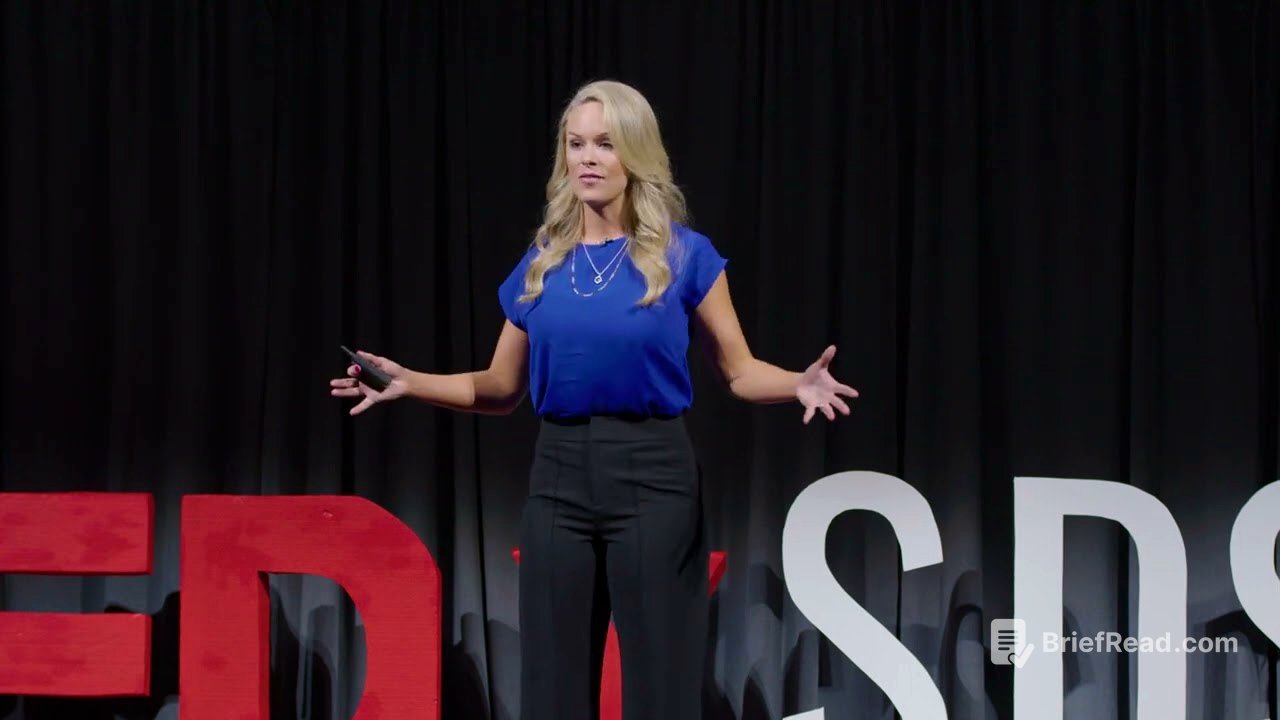TLDR;
The talk addresses the common resistance to change and introduces the idea that people resist loss, not change itself. It identifies five core types of loss—safety, freedom, status, belonging, and fairness—that are particularly painful in social environments. The speaker suggests that leaders should acknowledge these losses, highlight what remains the same during change, and consider the wisdom in resistance to lead effectively.
- People resist loss, not change.
- Five core losses: safety, freedom, status, belonging, fairness.
- Acknowledge losses, highlight what stays the same, and consider resistance.
Introduction: Trust Falls and Leading Through Change [0:04]
The speaker begins by recounting a humorous anecdote about a plane conversation where her profession as a leadership studies instructor was reduced to "trust falls". She clarifies that leadership development is about guiding people through uncertainty to build a better world. She then highlights the overwhelming amount of change experienced recently, leading to "change fatigue". Despite the constant change, many feel leaders have not effectively managed these transitions, as good leadership is the exception, not the norm, and is crucial for engagement and hope.
The Real Reason People Resist Change: It's About Loss [2:38]
Leaders often attribute the difficulty of leading change to people's resistance, which leads to frustration and the use of ineffective techniques like "because I said so". The speaker argues that the crucial mistake is failing to understand the true cause of resistance. Drawing from the work of Ron Heifetz and Marty Linsky, she asserts that people don't resist change itself, but rather what they stand to lose because of the change. Research suggests that the pain of loss is twice as powerful as the pleasure of gain, causing people to cling to the status quo.
Five Core Types of Loss [5:41]
The speaker identifies five core types of loss that are particularly painful in social environments:
- Safety: Change can jeopardise one's sense of physical and psychological safety, disrupting predictability derived from stable jobs, finances, relationships, and routines.
- Freedom: People need to feel they have a say in how their life unfolds. Employers mandating a full return to the office, against the preference for remote work, can expect resistance due to the constraint on autonomy.
- Status: Social hierarchies matter, and people resist changes that diminish their respect, significance, power, or influence. An example is given of Linda, who felt her 20 years of expertise were devalued by a new technology implementation.
- Belonging: While people want to stand out, they also want to belong. A client named Sarah experienced a bittersweet promotion because it strained her relationships with her former peers.
- Fairness: Inequitable decisions, such as those affecting the right to marry or exacerbating pay inequity, will be met with resistance.
The Importance of Identity [11:04]
The speaker explains that these core needs are deeply tied to our identities. When asked to give them up, we question who we are without certain roles, titles, or relationships. Change that requires giving up a part of ourselves feels like losing our footing. A study showed that students were more accepting of disruptive changes when they were reassured that core aspects of their program, like teamwork and fairness, would remain the same.
Leading Through Change: Anchors of Stability [13:22]
Leaders should act not only as champions of change but also as anchors of stability and stewards of identity. Even seemingly small changes can trigger significant emotional responses. To lead effectively, one must consider the wisdom in resistance, name the losses others are facing, and highlight what stays the same. By acknowledging losses and emphasizing enduring aspects of identity, leaders provide an anchor of stability, allowing people to embrace new possibilities.
Practical Steps for Navigating Change and Loss [14:09]
The speaker outlines practical steps for leading through change:
- Consider the wisdom in resistance: Resistance can reveal what is important to individuals and highlight potential flaws in change plans.
- Name the losses: Acknowledge the losses others are facing, as ignoring them breeds resentment. Acknowledging losses allows for grieving and acceptance.
- Shine a light on what stays the same: Highlight the enduring aspects of identity to provide stability.
- Turn towards possibility: Grounded in who we are, we can then dream about who we can become.
Personal Story: Finding Strength in Loss [16:00]
The speaker shares a personal story about not getting a dream job. Her mentor acknowledged the loss and reminded her that she could still pursue her passion elsewhere. The mentor's words helped her face the reality and consider future possibilities. The speaker concludes by encouraging listeners to practice leadership by listening to resistance, meeting losses with empathy, and anchoring themselves and others in unwavering aspects of their identities.









